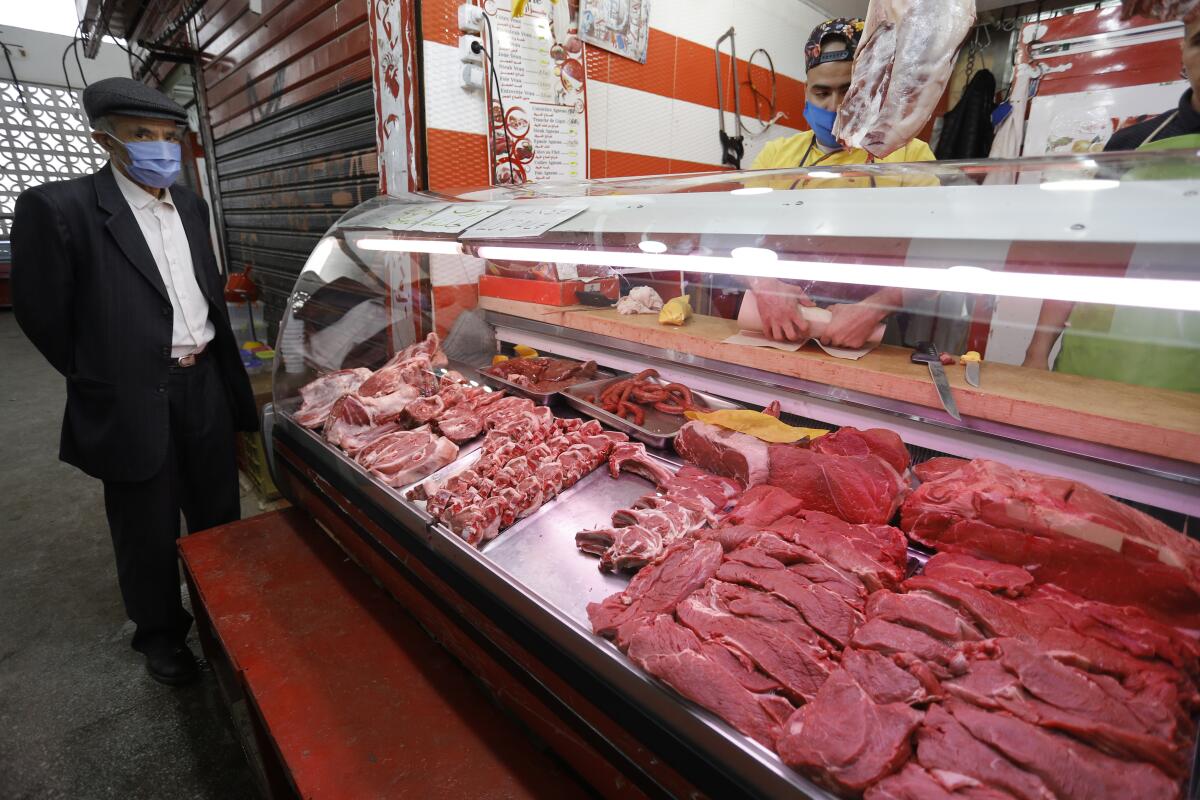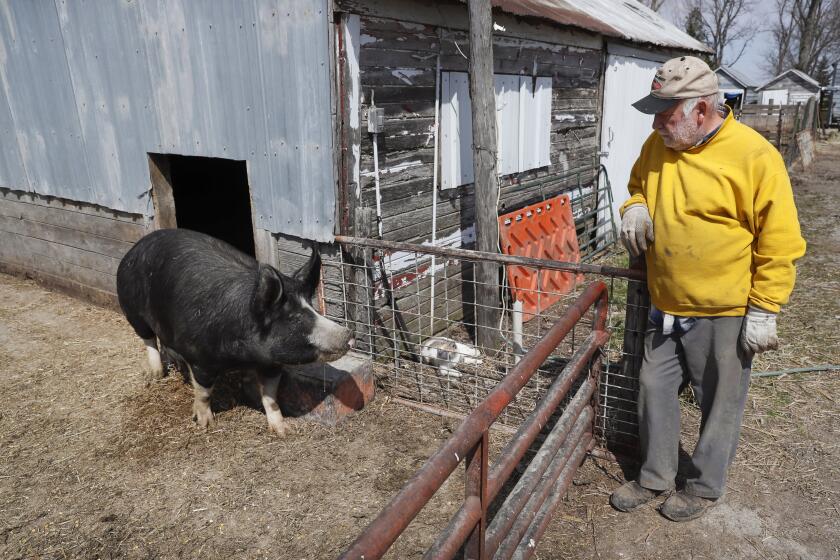Staggering shutdown in the meat industry raises concerns of a global shortfall

- Share via
It’s no longer just the U.S. that’s facing a meat scare. With shutdowns spreading in the world’s biggest exporters, serious questions are being raised over global shortfalls.
Brazil, the No. 1 shipper of chicken and beef, saw its first major closure with the shutdown of a poultry plant owned by JBS, the world’s biggest meat company. Though that’s only one facility down in a country with hundreds, the move raised concerns over whether more output could be affected.
In the U.S., where experts are warning that shortages are just weeks away, new shutdowns are hitting at a dizzying rate. Smithfield Foods Inc., the world’s No. 1 pork producer, said Friday that it was closing another operation, this one in Illinois. That news hit less than an hour after Hormel Foods Corp. said it was idling two of its Jennie-O turkey plants in Minnesota. A big hog-slaughter facility in Indiana is also shutting. Friday’s news added to a flurry of other halts announced in the space of just a few weeks.
Meanwhile, beef plants have also been taken offline in Canada, where industry groups are saying they’ll probably hold back some supplies that would usually be destined for export.
Taken together, the U.S., Brazil and Canada account for about 65% of the global meat trade.
“It’s absolutely unprecedented,” said Brett Stuart, president of Denver consulting firm Global AgriTrends. “It’s a lose-lose situation where we have producers at the risk of losing everything and consumers at the risk of paying higher prices. Restaurants in a week could be out of fresh ground beef.”
Restaurant closures due to the coronavirus have contributed to an estimated $5 billion in losses this year for the U.S. pork industry, and almost overnight millions of hogs stacking up on farms now have little value.
The escalation for supply threats has been staggering. A month ago, many analysts were assuring Americans that supplies were plentiful and the effects of the virus would be limited. Now there’s suddenly a chorus of experts raising the alarm over shortfalls. Prices are also surging. U.S. wholesale beef touched a record this week, and wholesale pork soared 27%, on pace for the biggest weekly gain since 2013.
Jersey Mike’s Franchise Systems Inc., which has 1,750 stores across the U.S., is working with ham supplier Clemens Food Group to ensure its supply of pork, something its stores sell quite a bit of in their sub sandwiches.
“We’re backing it up already because of the coming — we feel — the coming shortages,” said Peter Cancro, chief executive of Jersey Mike’s.
To be sure, some plants have come back online after testing workers and improving safety conditions, and most Brazilian facilities are still operating. Another point to consider: There haven’t yet been big shutdowns in Europe. The European Union accounts for about a fifth of global meat exports, U.S. government data show.
Still, executives from Tyson Foods Inc., JBS and Smithfield Foods have all warned that consumers are likely to see changes at the grocery store.
It should be noted that the output from a plant where infection pops up doesn’t pose health concerns because by all accounts COVID-19 isn’t a foodborne illness. Products from a farm or a production plant with a confirmed case can still be sent out for distribution. But a production halt means that there’s no new supplies.
And these shutdowns are happening at a time when global meat supplies were already tight. China, the world’s top hog producer, has been battling an outbreak of swine fever, which destroyed millions of the country’s pigs. Plus the virus is hitting supply at a time when some meat companies had already taken steps to slow output because of the closure of restaurants around the world.
Inventories can provide some cushion, though they may not last long.
Total American meat supplies in cold-storage facilities are equal to roughly two weeks of production. With most plant shutdowns lasting about 14 days for safety reasons, that further underscores the potential for deficits.
Meanwhile, with slaughterhouses closing, farmers don’t have a place to sell their animals. That’s forcing some livestock producers to dispose of them. It’s the latest cruel blow to supply chains, with food being wasted en masse at the same time that grocery store shelves are running empty.
It’s hard to say exactly why the virus is spreading so fast among meat-plant employees. Some analysts have cited the fact that these are usually low-paying jobs that are often filled by immigrants and migrants. Such vulnerable workers can live in cramped quarters, with sometimes more than one family sharing the same dwelling — so if one person gets sick, the disease can spread quickly.
Employees are also near one another on the job, with the work on some processing lines being described as “elbow-to-elbow.” Even if line speeds are slowed, workers spread out and shifts are staggered, there’s still the chance of mingling in break rooms and hallways. These plants see thousands of people coming in and out every day — it’s basically the opposite of social distancing.
At the same time, U.S. federal employees responsible for inspecting meat plants are falling ill. More than 100 inspection-service employees have tested positive for COVID-19, the government confirmed. At least two deaths of inspectors have been reported.
U.S. inspectors travel among facilities. That’s adding to fears that shutdowns will keep occurring if a sick federal employee brings the infection to plants where there’s not yet an outbreak.
In Brazil, JBS’s Passo Fundo poultry plant in Rio Grande do Sul state was ordered to close after 36 of its workers tested positive for the virus, said Priscila Schvarcz, a labor prosecutor in the municipality. The first COVID-19 case in the unit was reported April 13.
“Employees’ protection has always been the first JBS goal since the pandemic’s start. We’ll continue following that principle and trust that operations in Passo Fundo will be resumed shortly,” the company said in a statement to Bloomberg.
The chicken plant closure comes amid a jump in coronavirus cases in Brazil, which has reported about 53,000 cases and more than 3,600 deaths.
“Brazilian meat companies have been taking a lot of preventative measures, but we don’t see progress in agglomeration of people,” said Jose Modelski Jr., a spokesman for Contac, which represents food industry workers. “They are not willing to change the number of workers in the same shift, and we are worried about that.”
More to Read
Eat your way across L.A.
Get our weekly Tasting Notes newsletter for reviews, news and more.
You may occasionally receive promotional content from the Los Angeles Times.










